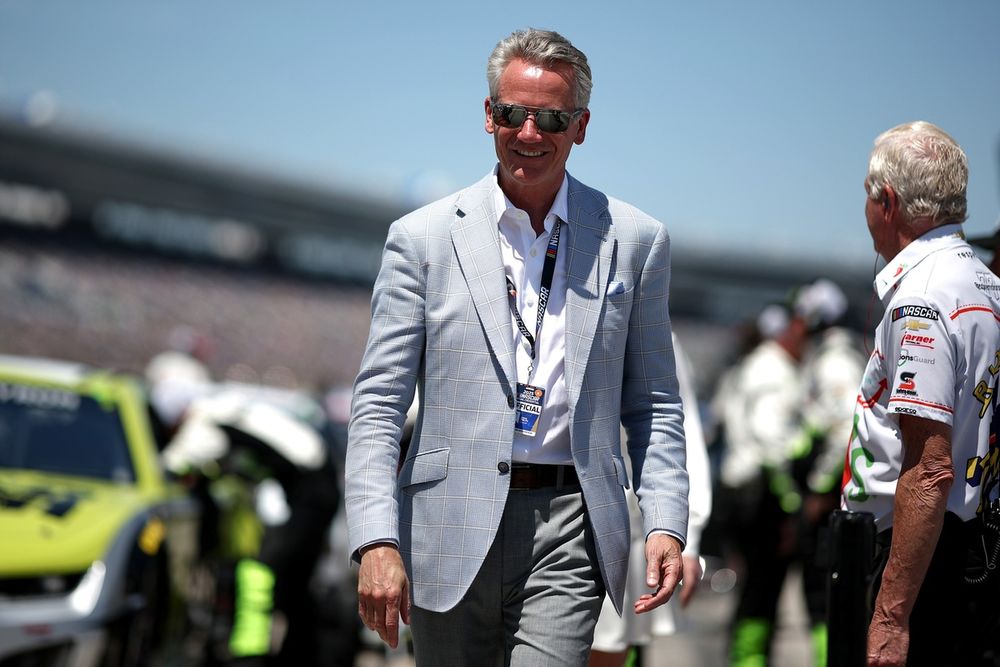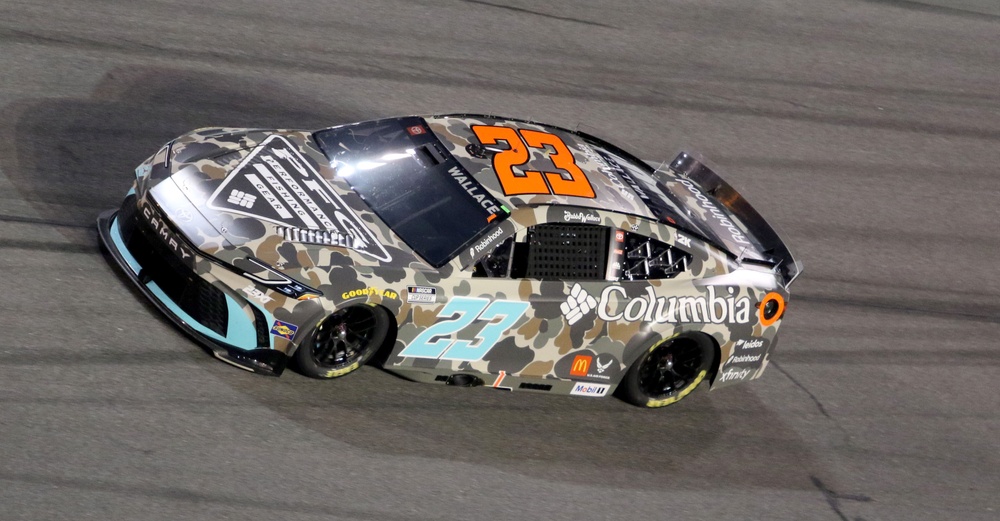23XI Racing and Front Row Motorsports claim NASCAR would put them out of business if the Sanctioning Body is permitted to transfer the charters at the heart of their legal dispute to other interested parties.
Earlier on Monday, NASCAR adhered to a court order that required it to notify all parties involved in the 23XI Racing and Front Row Motorsports v NASCAR federal antitrust lawsuit and countersuit if there were any pending agreements to transfer an ownership charter previously held by the teams to a different organization.
In the redacted filing, NASCAR said it had such an agreement pending the results of a Thursday hearing in which both parties will argue before federal district Judge Kenneth D. Bell in Charlotte, North Carolina.
Over the course of several legal filings, NASCAR has said that not executing agreements with new teams to take over the charters relinquished by 23XI and Front Row when it did not come to terms on an agreement with the league prior to the lawsuit would cause irreparable harm to the 2026 Cup Series season.
For the teams’ part, they claim they did not sign the agreement due to numerous examples of federal antitrust law violations that needed to be remedied in court. NASCAR, under the conviction that it will emerge victorious following the scheduled December 1, 2025 trial, now intends to transfer these charters to teams interested in acquiring the vacated charters.
The court initially issued a decision that forced NASCAR to recognize 23XI and Front Row as if they held charters but an Appeals Court in Richmond, Virginia overturned that decision, which opened the door for the league to begin negotiating with other racing organizations or private equity entities.
23XI and Front Row are now seeking a new injunction from the district court over what it believes to be a catastrophic result for them if NASCAR is allowed to transfer these charters prior to the antitrust lawsuit in December.
Making the case for irreparable harm
Bubba Wallace, 23XI Racing Toyota
Photo by: Malcolm Hope – Icon Sportswire via Getty Images
From the legal filing issued by attorneys representing the two teams on Monday afternoon:
“Plaintiffs will indisputably suffer irreparable harm if NASCAR is allowed to carry out its plan to immediately sell their charters to other entities before trial, because that would put 23XI and Front Row out of business following the 2025 Cup Series season. This Court has already found that it is not economically viable to race as open teams on a long-term basis, and NASCAR did not challenge that finding on appeal.”
The teams were also given chartered status back in December, prior to NASCAR’s successful appeal, because they claimed that without a charter, drivers and sponsors could execute contractual opt-out clauses and become free agents.
That point was again made on Monday.
“Plaintiffs will also suffer irreparable harm if they do not have charter rights for the rest of this season, because it will cause their drivers and sponsors to seek to leave. This is evidenced by …”
It is at this point of the document that the teams listed a very lengthy redacted example of such an outcome. Because of the redaction, the specific details were not made available to the public.
Disputing NASCAR’s claims

NASCAR President Steve Phelps
Photo by: Chris Graythen – Getty Images
In its own legal filings, NASCAR has stated that the court cannot force the Sanctioning Body to do business with a party it no longer wants to do business with, such as the teams suing it on antitrust grounds.
However, 23XI and Front Row disputed that legal standing on Monday:
“This Court has the authority to preserve the status quo and prevent NASCAR from selling the charters before the December 1 trial. Otherwise, Plaintiffs will face the imminent destruction of their businesses regardless of how the jury rules.”
The 23XI and Front Row filing also argue that the court could force NASCAR into business with them should it be decided that the Sanctioning Body is in violation of federal antitrust laws due to a precedence found in Google Play Store Antitrust Litig, 2025.
There were also several other historical precedents referenced within the document.
“If the jury finds that NASCAR has violated Section 2, this Court will have broad remedial powers to restore Plaintiffs’ charter rights. Courts regularly order a defendant to deal with parties harmed by anticompetitive conduct following a finding of Section 2 liability.”
Key takeaways
Riley Herbst, 23XI Racing Toyota, Zane Smith, Front Row Motorsports Ford
Photo by: James Gilbert / Getty Images
The key takeaway from the Monday filing, ultimately, is that the teams believe that NASCAR will wrongfully force them out of business before a trial in December can even take place — even if the teams’ antitrust claims were eventually found to be justified.
The teams, despite the ruling from the Fourth Circuit of Appeals over the summer, also are making a renewed motion for the district court to issue a new injunction to restore their de facto charter status. The filing includes a new reason, presumably the result of fact discovery, but it is redacted and not publicly available.
NASCAR, again, claims that not moving forward with teams interested in replacing 23XI and Front Row in the charter system so close the 2026 season will bring irreparable harm to their business but the teams refute that.
The reasons are also publicly redacted, however.
More broadly, NASCAR said in a filing last week that it is not a monopsony because it allows its teams to race in CARS Tour – a Mid-Atlantic Late Model series owned by Dale Earnhardt Jr., Kevin Harvick, Justin Marks and Jeff Burton.
The teams rejected that argument pretty adamantly.
“The cases NASCAR cites to argue against its monopsony power are off point. They involve markets for amateur auto clubs, dirt track racing, or an entertainment output market that have no relevance to the input market for premier stock car racing that Plaintiffs have proven in this case. NASCAR cannot seriously argue that dirt track or amateur racing are substitutes for the top-tier stock car teams competing in the Cup Series.”
And where NASCAR refuted claims that it has not acted as a monopsony because it increased the revenue to teams for this charter period for the 13 of 15 organizations that signed, 23XI and Front Row say that is irrelevant because the Sanctioning Body still ‘exercised monopsony power to impose terms on the teams below those that would be present in a competitive market.’
Beyond that, 23XI and Front Row say in their filing that NASCAR has no response to ‘smoking gun documents’ that show examples of monopolistic behavior but that section of the document is also heavily redacted.
The teams also continue to allege uncompetitive behavior in the form of restrictions placed on where Cup Series teams can now race the NextGen car that were not present with previous generations of cars and also the acquisitions of both ARCA and International Speedway Corporation; in addition to event restrictions placed on Speedway Motorsports Inc.
“Internal NASCAR documents and testimony also show how NASCAR used its acquired control over ISC to deny competitors access to tracks that were needed to compete and how the acquisition of ARCA eliminated a nascent potential competitor (monopolist’s acquisitions “to neutralize . . . likely future competitors” were actionable conduct).
“The evidence thus demonstrates that rather than limiting itself to acts of competition on the merits, NASCAR engaged in an interrelated series of exclusionary acts that had the purpose and effect of preserving its monopsony power.”
And also:
“NASCAR’s arguments that its track exclusivity agreements are procompetitive fare no better. NASCAR’s free-riding claim is factually bereft: NASCAR bought track operators (ISC, Bowman Gray) and forced an exclusivity agreement on Speedway Motorsports (SMI) and other independent companies that built and ran their own tracks. NASCAR did not make the investments; the tracks did. The argument that SMI’s exclusivity only lasted for several years again distorts the facts:
The 23XI and Front Row legal filing then listed its rebuttal to this point, but like much of this document, it was also heavily redacted.
This filing also wants the court to restore the chartered status overruled by the Fourth Circuit, which would once again entitle the teams to receive payment as if they owned charters.
These are all topics that will be argued in front of Judge Bell on Thursday in his Charlotte courtroom. A decision will be unlikely issued before the weekend and may take a week or longer based on the process that came with the first injunction request granted to the teams.
In this article
Be the first to know and subscribe for real-time news email updates on these topics
Read the full article here


